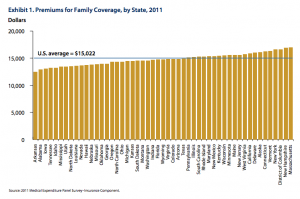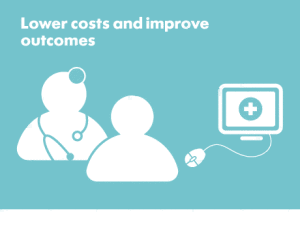Several data points in the form of articles or news updates crossed my desk today. They resonated with the theme of my most recent HealthBlog post “Patientnado—the storm that’s about to hit healthcare”.
Several data points in the form of articles or news updates crossed my desk today. They resonated with the theme of my most recent HealthBlog post “Patientnado—the storm that’s about to hit healthcare”. In that blog post I discussed the likely impact Health Reform (aka Obamacare) will have as 30 million or so new patients, armed with freshly-minted health insurance, try to find doctors in an already-strained system.
 A June 27th article by Yevgeniy Feymana and Paul Howard states that even before the enactment of health reform legislation, health-system researchers have reported that the US faces a growing shortage of physicians across all specialties. The shortfall is predicted to be 130,000 physicians by 2025. A new report by Feymana and Howard for the Manhattan Institute states that roughly a quarter of the doctor shortage will be among primary care physicians. This is worrisome since primary care is ideally the gateway or entry point for the millions of newly insured patients who will be hitting the healthcare system. This shortfall is already illustrated by some data coming from the state of Massachusetts which is often held up as an early model for health reform. According to the Massachusetts Medical Society, the percentage of family doctors accepting new patients in that state has dropped 19 percent over the last seven years. The percentage of internists taking new patients dropped 21 percent over the last 9 years. The number of pediatricians accepting new patients has fallen 10 percent over the last four years.
A June 27th article by Yevgeniy Feymana and Paul Howard states that even before the enactment of health reform legislation, health-system researchers have reported that the US faces a growing shortage of physicians across all specialties. The shortfall is predicted to be 130,000 physicians by 2025. A new report by Feymana and Howard for the Manhattan Institute states that roughly a quarter of the doctor shortage will be among primary care physicians. This is worrisome since primary care is ideally the gateway or entry point for the millions of newly insured patients who will be hitting the healthcare system. This shortfall is already illustrated by some data coming from the state of Massachusetts which is often held up as an early model for health reform. According to the Massachusetts Medical Society, the percentage of family doctors accepting new patients in that state has dropped 19 percent over the last seven years. The percentage of internists taking new patients dropped 21 percent over the last 9 years. The number of pediatricians accepting new patients has fallen 10 percent over the last four years.
 Another article that caught my attention today was one by Jen Wieczner of the Wall Street Journal titled, “The doctor won’t take your call”. In it, Ms. Wieczner explains the pain physicians are feeling over the spiraling increase in telephone calls to their practices. Answering all those calls (for some practices hundreds or thousands of calls a day) takes a toll on office staff, is a time sink for docs (for which they are seldom reimbursed) and is legal quicksand for malpractice if calls are ignored or the wrong information is conveyed. The problem will likely only get worse as more and more patients who are insured, but have high-deductible plans, seek care and advice without having to actually make an appointment thereby avoiding being charged for an office visit. As the Wall Street Journal article points out, doctors are increasingly wary of giving out free advice on the telephone. Although some insurers and health plans, including Medicare, are compensating doctors for time on the phone with some patients, this is the exception rather than the rule. As a result, many doctor practices are off-loading telephone responsibilities to call centers and a variety of companies that specialize in on-line, health information and triage solutions.
Another article that caught my attention today was one by Jen Wieczner of the Wall Street Journal titled, “The doctor won’t take your call”. In it, Ms. Wieczner explains the pain physicians are feeling over the spiraling increase in telephone calls to their practices. Answering all those calls (for some practices hundreds or thousands of calls a day) takes a toll on office staff, is a time sink for docs (for which they are seldom reimbursed) and is legal quicksand for malpractice if calls are ignored or the wrong information is conveyed. The problem will likely only get worse as more and more patients who are insured, but have high-deductible plans, seek care and advice without having to actually make an appointment thereby avoiding being charged for an office visit. As the Wall Street Journal article points out, doctors are increasingly wary of giving out free advice on the telephone. Although some insurers and health plans, including Medicare, are compensating doctors for time on the phone with some patients, this is the exception rather than the rule. As a result, many doctor practices are off-loading telephone responsibilities to call centers and a variety of companies that specialize in on-line, health information and triage solutions.
As I pointed out in my “Patientnado” post, the time has clearly arrived to start thinking in new ways about how we manage large populations of patients by applying exactly the most appropriate information and services in the most appropriate ways at the most appropriate time and place. In my own experience, I’m starting to see physician practices making use of communication/collaboration and customer relationship management tools that have become commonplace in other industries.
As a primary care physician, my heart goes out to colleagues who are struggling to stay afloat financially, let alone deal with the stress of these changing times and increasing patient demands. But physicians are a hearty, creative lot. Given more contemporary technologies and access to information on best practices, I believe they will adapt to meet the demands of health reform and whatever else comes at them in the future.








